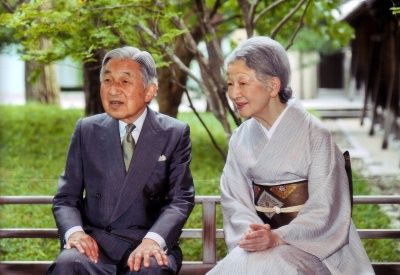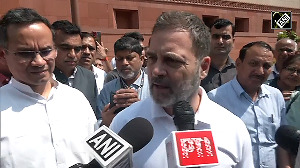 Japanese Emperor Akihito and his wife Empress Michiko’six-day trip on Saturday to India is expected to be defining moment in India-Japan relations.
Japanese Emperor Akihito and his wife Empress Michiko’six-day trip on Saturday to India is expected to be defining moment in India-Japan relations.
A state visit by the Japanese Emperor is a rare event, for he seldom travels out of Japan except for occasions like coronations and similar royal functions.
Though the Japanese monarch has no political role, he is held in high esteem within Japanese society as the symbol of the state. The state visit by the 79-year old Emperor Akihito is being viewed in New Delhi as a singular gesture that underscores the special and deepening nature of Japan-India ties.
To say that the Indian government is laying out the proverbial red carpet would be to miss the significance of the visit and effort that has gone into its planning.
There is an elaborate protocol laid down for visiting monarchs, heads of state and government and other dignitaries, but the arrangements being made for the Japanese visit are of a distinctive nature.
The Imperial couple had visited India in 1960 when they were Crown Prince and Princess as part of their honeymoon tour. They are said to have very fond memories of that trip and the Indian government is making an effort to re-connect them with those happy memories.
Their itinerary includes visits to places that they had visited in their last tour.
Former ambassador to Japan Arjun Asrani who was posted in Japan as a junior diplomat in 1960 when the royal couple last visited India, recalled the preparations made for that trip. “India and Japan had good relations at that time and a great deal of care had gone into the arrangements for that tour.”
Aside from their meetings with President Pranab Mukherjee, Prime Minister Manmohan Singh, Leader of Opposition Sushma Swaraj and other formal engagements, the visitors will have several events on their schedule.
In Delhi, they will visit the India International Centre, the premier intellectual hub of the capital, to recreate their visit 53 years ago when then Crown Prince Akihito laid the IIC’s foundation stone. A large plaque prominently displayed in the IIC is a reminder of the visit.
The royal couple will have a “walk through” the Centre’s library and conference halls to have a photograph taken next to the plaque and meet some of the oldest members of the IIC who were present at their last visit.
They will view an exhibition of photographs of their last visit to India drawn from private collections and the archives; the exhibition has also been on display in Tokyo. There is a visit on the programme to Jawaharlal Nehru University’s department of Japanese Studies and an event at the Japanese School. In Chennai they will visit Kalakshetra.
Minister Manmohan Singh has laid a special emphasis on developing India-Japan ties in the United Progressive government’s second term. As part of the preparations for the visit, he had taken the unusual step in April this year to appoint a special envoy especially for the imperial visit.
Former minister, Ashwini Kumar was appointed special envoy with Cabinet rank to make preparations for the state visit.
A votary of strong Japan-India ties, Prime Minister Shinzo Abe, who is expected visit India early in the new year, has imparted a fresh enthusiasm in building up the relationship with India.
Japan is the source of the highest official foreign assistance for India as well as a major investor in India and its infrastructural development. After the successful implementation of the Delhi Metro, Japan is involved in mega projects the Western Delhi-Mumbai freight corridor, the Delhi-Mumbai industrial corridor and the Bangalore Metro project.
The comprehensive economic partnership agreement that was implemented in 2011 has strengthened the economic ties.
Aftab Seth, former ambassador to Japan explained that an imperial visit was a rare event. “It has a special meaning for the Japanese people. It is a signal of a special relationship, of warm friendly ties.
India-Japan ties have been improving in the past decade; all Japanese governments in the past decade have sought to build the ties with India.”
It is not the political content but the symbolism of the visit that indicates the maturing of India-Japan ties into an enduring strategic and global partnership.
Image: Japan's Emperor Akihito and Empress Michiko are seen at the Imperial Palace in Tokyo in Japan
Photograph: Handout via Reuters











 © 2025
© 2025